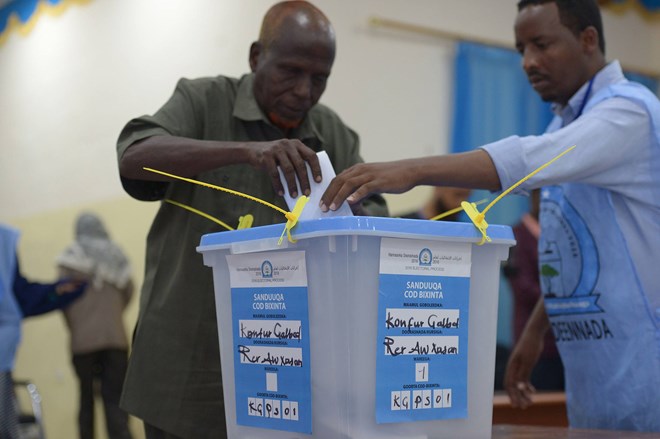
Tuesday May 3, 2022

Credit: SIMON MAINA AFP/Getty Images
Election of parliament leaders in Somalia paves way for presidential vote. After the protracted delays and obstacles in choosing the members of parliament, the election of the parliamentary leadership is a major achievement of Somalian governance. A power struggle between the prime Minister and president has contributed to the delayed election process in Somalia. The elections had been scheduled for a year ago but were delayed when Mohamed tried to extend his four-year term by two years, a move thwarted by parliament.
Election of parliament leaders in Somalia paves way for presidential vote. After the protracted delays and obstacles in choosing the members of parliament, the election of the parliamentary leadership is a major achievement of Somalian governance. A power struggle between the prime Minister and president has contributed to the delayed election process in Somalia. The elections had been scheduled for a year ago but were delayed when Mohamed tried to extend his four-year term by two years, a move thwarted by opposition figures and their supporters in the military.
The election of speakers in the parliament and senate is a key step to form the new government, which must be in place by May 17 if Somalia is to continue receiving budget support from the International Monetary Fund. Somalia’s international partners have already welcomed the successful elections for leadership positions in the Upper House on April 26, 2022 and the House of the People on April 27-28, 2022.
The President election will now be completed promptly, peacefully, and credibly, so that Somalia’s elected leaders can address national priorities for the benefit of all its citizens.
The MPs of the Lower House unanimously voted to elect Sheikh Aden Madobe as the new speaker in an election held in Mogadishu. Madobe who was declared the winner has previously served as speaker of the house during the transitional period between 2007 and 2010.The election took hours and ended in the second round with Madobe garnering 163 votes while his close contender Hassan Abdinur got 89 votes.
Mr. Abdi Hashi Abdullahi received 28 votes, candidate Salah Ahmed Jama received 24 votes, while Information Minister Osman Abukar Dubbe received 2 votes.
Ali Shabaan Ibrahim became the first deputy speaker of the upper house. He received 28 votes, while Abdihakin Moalim Ahmed received 25 votes.
Madobe (Hadame sub-clan of the Rahanweyn (Digil and Mirifle clan) is a veteran opposition figure and is seen by local analysts as a pragmatic and moderate counterpoint to President Mohamed (the Marehan, a sub-clan of the Darod clan). He is not known to be allied with either President Mohamed Abdullahi Mohamed or Prime Minister Mohamed Hussein Roble, who have been sparring bitterly in recent months over the election process and security matters.
Senator Abdi Hashi Abdullahi, a long-serving senator and critic of the president, was re-elected as speaker of the upper house of the Federal Parliament. He competed against Salah Ahmed Jama and Osman Abukar Dubbe.
Our case study of March 2020 attests to the fact that the re-election of Jubbaland’s President Ahmed Islam Madobe in summer, 2019 was a major setback for Somalian President Mohamed Abdullahi Farmaajo’s efforts to gain control over Somalia’s federal states and establish a strong central government.
Relations between Mohamed and Roble have been frosty for some time. Last year, the presidency announced that Mohamed had suspended Roble and halted his duties as he was allegedly linked to corruption. Roble, however, instead accused the President of not wanting to hold credible elections after postponements. This disagreement in the Federal Government of Somalia (FGS) leaders started soon after President Farmajo appointed Roble as prime minister to succeed Hassan Ali Khayre (Murusade/Habr Gidir sub-clan), the longest-serving prime minister. Khayre and Mohamed previously clashed over the election model, including when and how the election process and procedures would be completed. Prime Minister Roble continues the policy of his predecessor to disagree with the president regarding the election model, with huge mistrust between the offices of the president and prime minster that ended in a public clash between them.
Mohamed wanted a “one-man, one-vote” universal suffrage system rather than the clan-based, indirect ballots of the past. In Somalia, delegates appointed by clans choose members of the lower house who later elect the president. The 54 members of the Senate, representing the country’s five regional states, also take part in the presidential vote.
However, there is a doubt that clan interest-free model (direct vote) will meet Somalian clan fragmented society interests. Especially considering a fact, that large parts of south-central Somalia are still under the control of the militant group Al-Shabaab.
This is why Khayre and Roble alongside other political stakeholders also believe indirect vote is currently suitable for Somalia, as the country is still recovering from the civil war effect, as clans need to go through real reconciliation.
The opposition now control both houses of parliament and the chance for Farmaajo to be the next president is becoming slimmer.
Mohamed Farmaajo, is expected to run for re-election. His likely opponents include two former presidents (Sharrif Sheikh Ahmed and Hassan Sheikh Mohamud), a former prime minister Hassan Ali Khaire, and the current leader of the Puntland region.
However, Farmaajo, once Somalia’s most liked president, has lost the support of many people because of his failure to defeat militant group al-Shabab and for allegedly deploying Somali soldiers to Ethiopia to fight Tigrayan rebels.An attempt last year by the lower house to extend Farmaajo’s term for another two years was also widely unpopular.